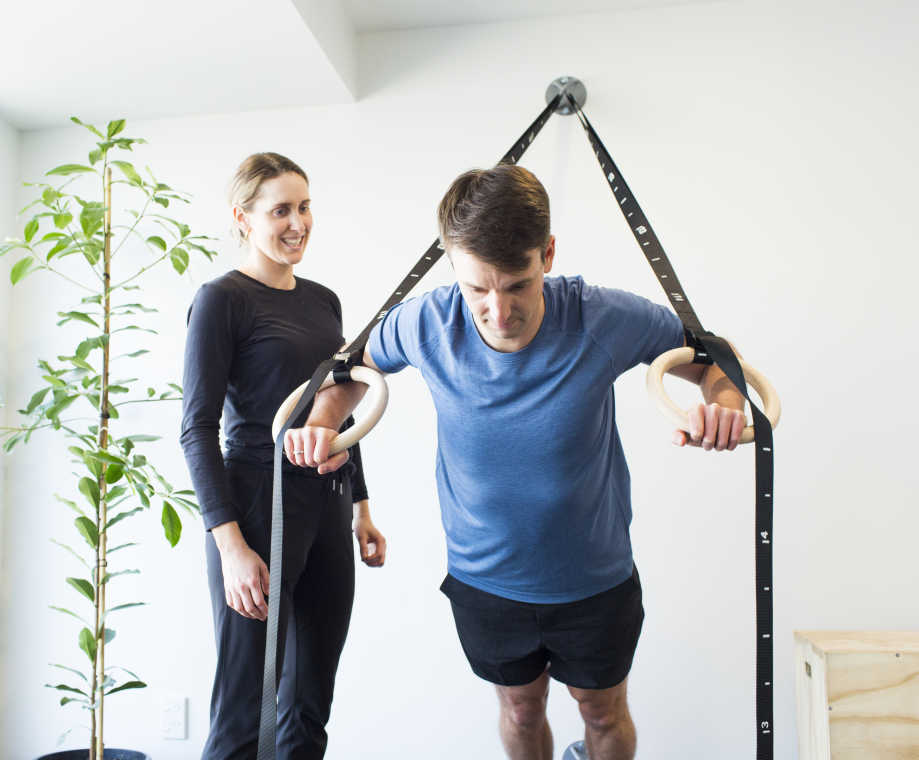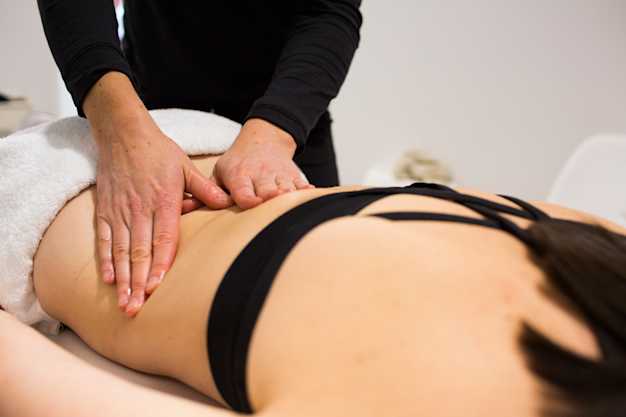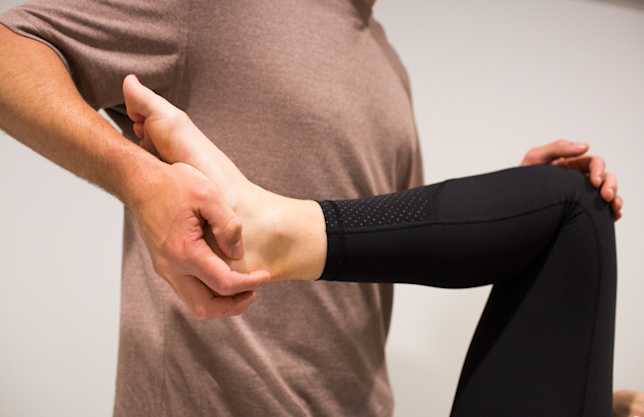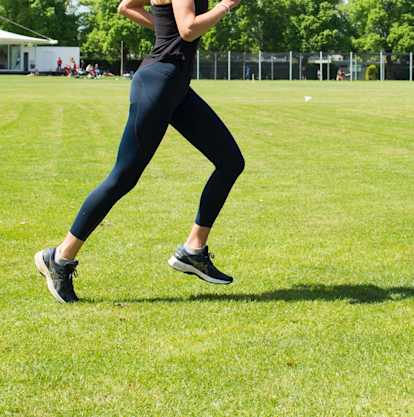Physiotherapy services

Our physiotherapists at Four are highly experienced in assessing and treating a wide range of musculoskeletal injuries and conditions. When you book in with us, you can expect an accurate assessment and diagnosis, quality treatment options and all round good vibes.
Click below for more info on the different treatment options and injuries we can manage. Or book online easily now!
Your local Christchurch physiotherapists
Looking for a physio in Christchurch? We understand that being injured or in pain is no fun! Luckily for you, all of our physios at Four are highly experienced and are here to help you get back to doing what you love!
We have longer appointment times than normal, to ensure that we take the time to get to know you and your individual goals. We are skilled in a variety of treatment options which include:
Manual therapy and joint mobilisation
Safe exercise prescription
Taping and bracing
Sports Physiotherapy
We offer both ACC and private consultations for all of your injury and rehabilitation needs. No doctors referral required. We can register your ACC claim for you at your first session.
Wondering if we can help you? See below for a list of common injuries and conditions that we treat.
Our team of sports physios here at Four are some of the best physios in Christchurch! With our experience working alongside sports teams - both local and regional, aligning with gyms and running groups, and with our individual sporting backgrounds, we know how it feels to be out with an injury, and what it takes to get you back in the game!
Common sporting injuries that we see include:
Foot injuries such as plantar fasciitis
Ankle sprains
Knee injuries including ACL tears, both pre and post-operative
Running-related injuries
Hip or groin pain
Lower back and neck pain
Shoulder injuries such as rotator cuff tears and bursitis
Elbow injuries such as tennis elbow
Wrist pain or injuries
Acute fractures and stress fractures
Our physios in Christchurch are able to assess, diagnose and manage all of the above. Treatment often involves initial pain and load management, hands on treatment, and sports-specific exercise prescription to help get you back to sport ASAP and without the risk of recurrent injury! We also work closely with a number of Christchurch specialists for those more complex injuries requiring medical management or high-tech imaging.
Our physios in Christchurch are experienced in treating a wide range of surgical procedures both before your surgery date and after. Common conditions requiring surgery that we see here at Four include:
Ankle ligament reconstruction
ACL repair
Knee meniscus repair
Fracture repair e.g. internal or external fixation
Shoulder surgery e.g. rotator cuff repair
Spinal surgery
Joint replacement surgery for osteoarthritis e.g. total hip or knee replacements
Often the wait-times for surgery can be weeks or even months, during this time physiotherapy is important in managing your pain and symptoms, as well as improving range of movement and strength. Ultimately, the fitter and stronger you are pre-surgery, the better the outcome you will have post-surgery - including a faster recovery! We refer to this phase as “prehab” and it is a very important part of the surgical process.
Post-operative rehabilitation should commence immediately after surgery - you should be seen by a physio during your stay in the hospital who will set you up with some basic post-operative exercises. We would then ideally aim to see you in the clinic within the first 1-2 weeks after being discharged from hospital.
During the early stages of post-op recovery, the main focus of physiotherapy treatment will be on pain management, reducing swelling, and increasing range of movement. This can be done through hands on treatment, exercise prescription and pain relief which may be prescribed by your surgeon or GP - throughout the duration of your recovery we aim to maintain regular communication with your surgeon to ensure that your care is tailored specifically to your needs.
Following this phase, your physio will gradually progress your exercises and your physical load in order to improve your strength and fitness and to help you get back to your previous level of activity.
Pain related to the lumbar spine, or lower back pain, is a common condition that affects a large majority of our population. This is something that we see and treat often in the clinic, and can occur as a result of an acute injury or longstanding (chronic) condition.
Common causes of lower back pain that our Christchurch physios see and treat include:
Non-specific lower back pain - this can be the result of an acute injury or accident, or may occur over time due to weakness, poor posture or poor movement patterns
Disc-related lower back pain i.e. “bulging disc” - this can involve nerve pain and symptoms
Degenerative conditions such as osteoarthritis
Pregnancy-related lower back or sacroiliac joint pain
Physio treatment aims to reduce pain, restore range of movement and improve function to help get you back to performing your normal daily activities comfortably and pain-free. A combination of education, postural correction, hands-on treatment, combined with stretching and strengthening is often used in the treatment of lower back pain. Primarily, we aim to strengthen the deep abdominal, hip and back muscles which support your spine in order to prevent the risk of recurrent pain and injury.
Clinical reformer pilates is another form of treatment we offer at Four to help strengthen the core muscles and improve posture in the management of back pain or injury. Depending on your rehab plan or preference, this may be of benefit to you!
Pain related to the cervical spine, or neck pain, can occur as a result of an acute injury, postural issues, or a longstanding (chronic) condition. In some cases neck pain can lead to cervicogenic headaches, which are secondary headaches that occur due to dysfunction or issues in the upper cervical spine.
Common causes of neck pain that our Christchurch physios see and treat include:
Acute wry neck
Whiplash
Neck strains/sprains/fractures
Disc-related neck injuries - this can involve nerve pain and symptoms
Posture-related neck pain
Degenerative conditions
During your appointment your physiotherapist will identify the cause of your neck pain or headache. This may be related to joint dysfunction, or as a result of tight muscles which attach into the head, neck or shoulder - or in most cases, a combination of both!
Physio treatment may involve education, postural correction, hands-on treatment, combined with stretching and strengthening. This is aimed at reducing pain, restoring range of movement and improving function to help get you back to performing your normal daily activities and exercise comfortably and pain-free.
Tendon injuries are a real pain, literally! They can happen to any of us, and are often the result of overloading the tendon tissue through too much repetitive or heavy exercise, and can also occur as a result of a sudden event or accident.
Some examples of tendon injuries that our physios in Christchurch see include:
Tendon injuries of the foot and ankle e.g. tibialis posterior and peroneal tendons
Achilles tendinitis/tendinopathy
Achilles rupture
Patella tendinopathy
Gluteal tendon issues such as greater trochanteric pain syndrome (GTPS)
Rotator cuff injuries
Tennis elbow and golfer’s elbow
Tendon injuries of the wrist and hand e.g. De Quervain’s tenosynovitis and intersection syndrome
Due to the slow healing nature of tendons, physiotherapy input and rehabilitation are super important in assisting you to a speedy recovery and return to sport or exercise. We put the work in to get you back to doing what you love!
Physiotherapy treatment uses a combination of manual therapy, education on reducing pain and inflammation, load management including progressive loading through rehabilitation, stretching and strengthening exercises, and biomechanical correction to reduce your risk of re-injury.
Muscle strains are a common sporting injury but can occur to any of us at any time! All that is required is a sudden force that either stretches the muscle beyond its limits or contracts the muscle too strongly, leading to damage to the muscle tissue, ouch!
Common muscle injuries that our physios in Christchurch see include:
Calf strains
Hamstring strains
Quadriceps or hip flexor injuries
Bicep tears
Lower back injuries
Abdominal or intercostal muscle strains
Chest, neck or shoulder strains
Muscle strains can vary in severity from a mild stretch to a full rupture, they can be categorised into three different grades:
Grade 1: Mild damage affecting only a small number of muscle fibres, resulting in minimal loss of strength and range of motion.
Grade 2: More extensive damage with more muscle fibers involved, however the muscle is not completely ruptured. These injuries present with mild swelling, more noticeable loss of strength and range of motion, and sometimes bruising.
Grade 3: This is a complete rupture of a muscle, and can present with a palpable defect at the injury site. These injuries result in a complete loss of muscle function, as well as significant pain, swelling, tenderness and bruising.
Physiotherapy treatment for low to moderate grade muscle injuries involves a combination of education, hands-on treatment, stretching and strengthening exercises, progressive loading through rehabilitation, and biomechanical correction to reduce your risk of re-injury.
For more significant or high grade injuries, these may require a surgical or specialist opinion. At Four, we work alongside many of Christchurch’s leading specialists and can arrange surgical referrals if required.
Injuries or issues affecting neural tissue can lead to pain and discomfort which may affect us with everyday movements, activities, and sometimes even while resting or sleeping. There are many different causes of nerve pain - our aim is to identify the source of your symptoms and settle them down in order to get you back to normal, pain-free life.
Common causes of nerve pain that our Christchurch physios see include:
Neck, shoulder, or arm pain due to cervical nerve compression or irritation
Carpal tunnel syndrome
Upper or lower limb nerve entrapments
Lower back, hip or leg pain due to lumbar nerve compression or irritation e.g. sciatica
Piriformis syndrome
Nerve pain can often be described as sharp, shooting or stabbing pain, or sometimes a burning sensation in the affected area. There may also be a feeling of pins and needles or numbness, and in some cases associated weakness or reduced tendon reflexes.
These symptoms can be felt in a referred area of the nerve itself, such as radiating pain down your arm or leg. For example, pain felt down the back of the hamstring and calf is in the distribution of the sciatic nerve and is commonly referred to as sciatica.
Physiotherapy firstly aims to identify where the nerve is being pinched, stuck or compressed along it’s pathway as it travels from the spinal cord to the peripheral body. Treatment is then aimed at reducing irritation on the nerve and improving nerve gliding in order to centralise and reduce neural symptoms.
This can be achieved through rest, postural correction, education on self-management of pain and inflammation, manual therapy, and exercise prescription. If further treatment or investigative imaging is indicated, our physios can help! We work alongside many of Christchurch’s leading specialists and can arrange specialist referrals if required.
Pricing
**Please note our prices will increase by approximately 5% from 01st March 2026. This adjustment helps us to maintain the quality of care and service we provide. Thank you for your continued support. **
Frequently asked questions
Nope! You can book in with us directly through our website or via email/phone call without prior referral - it’s that easy!
Depending on the nature and onset of your injury, you may be eligible for ACC-funded treatment. This means that you pay a subsidised appointment fee rather than the full private cost. If you don’t have an ACC claim already, your physio can discuss this with you at your initial appointment and create a claim for you online. Read here to find out more about how ACC works.
If you have any relevant documentation such as a referral letter from your doctor or specialist, ACC claim details, or anything else that may be useful then please bring it along to your first appointment.
We always have a spare pair of shorts and blankets/towels in the clinic, so if you forget to wear the appropriate clothing on the day we’ve got you covered - literally!
Please note: if you are attending a running clinic consultation then please remember to wear active wear, and bring along your running shoes plus orthotics if you have them.
Imaging (plain X-ray, ultrasound or MRI) can be indicated in the event of certain injuries or conditions, although this depends on your presentation, history and symptoms. Our physios can arrange referrals for imaging if appropriate, and work alongside many of Christchurch’s leading specialists if further investigation is required.
The Four team are busy bees! Which means our diaries can get booked up, sometimes weeks or even months in advance! We apologise for this, and aim to do everything we can to accomodate to the needs of our Four clients.
If you are struggling to find a time that works for you, don't hesitate to contact us via phone call or email. We have a cancellation list which we can add you to, and we will let you know if an earlier appointment time becomes available.
For general physiotherapy bookings for acute injuries, we aim to hold some last minute appointments each week, these may not be visible in our online booking system, so once again please get in touch if you are in need of an urgent appointment!


